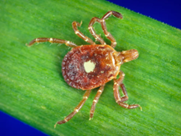
This paper, titled “Tick-borne disease infections and chronic musculoskeletal pain,” was published on January 11th in JAMA Network Open.
The study was a collaborative effort between the UNC Institute for Global Health and Infectious Diseases (led by ID fellow Diana Zychowski, Haley Abernathy, Dana Giandomenico, Ross Boyce), and the Thurston Arthritis Research Center and Core Center for Clinical Research (Carolina Alvarez, Shailesh Choudhary, Julia Vorobiov, Amanda Nelson, and Scott Commins), including members of the Divisions of Infectious Disease and Rheumatology, Allergy, and Immunology.
Prior tick-borne infections have been associated with non-specific, lingering symptoms by patients despite a lack of evidence. Using a multi-disciplinary approach to analyze radiographic osteoarthritis, questionnaires, physical assessments, and biospecimens, the team asked whether tick-borne diseases were associated with chronic musculoskeletal symptoms. The study found a high prevalence of tick-borne disease exposure in the Johnston County, NC population, as well as a high frequency of alpha-gal IgE positivity. Only alpha-gal IgE levels were associated with knee symptoms of pain, aching, and stiffness. Interestingly, symptomatic radiographic knee osteoarthritis was not statistically associated with alpha-gal IgE or evidence of tick-borne infection; however, higher levels of alpha-gal IgE were associated with increased knee pain severity score.
This unique study demonstrates the connection between osteoarthritis (OA), allergy, and immunology research. Data from the population-based Johnston County Osteoarthritis Project (JoCoOA), as well as statistical support from the UNC Core Center for Clinical Research (CCCR) was leveraged for this study, underlining the intersecting resources made available at TARC.
Click here to read the full article available on the JAMA Network website.